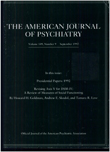Christian Psychiatry: the impact of evangelical belief on clinical practice
Abstract
OBJECTIVE: The authors surveyed psychiatrists in the Christian Psychiatry movement to assess the role of religious belief in their practices. METHOD: The psychiatrists were members of the Christian Medical and Dental Society; questionnaires were sent to 260, and usable responses were received from 193. The subjects were asked about demographic and practice variables, "born again" religious experiences, group cohesion, and beliefs about using the Bible and prayer in treatment. RESULTS: The respondents were somewhat more religious than Americans overall, who are themselves more religious than most psychiatrists. Nearly all reported having been "born again," after which they generally experienced a decrease in emotional distress. There was a significant difference in the respondents' affiliative feelings toward psychiatrists in the Christian Psychiatry movement and other psychiatrists. For acute schizophrenic or manic episodes, the respondents considered psychotropic medication the most effective treatment, but they rated the Bible and prayer more highly for suicidal intent, grief reaction, sociopathy, and alcoholism. Whether or not a patient was "committed to Christian beliefs" made a significant difference in whether the respondents would recommend prayer to the patient as treatment. About one-half said they would discourage strongly religious patients from an abortion, homosexual acts, or premarital sex, and about one-third said they would discourage other patients from these activities. CONCLUSIONS: Many studies have suggested a need for more sensitivity to religious issues by psychiatrists, and this study provides systematic findings on one approach. It remains important to evaluate ways in which a religious perspective can be related to clinical practice and what benefits and problems may derive from such a relationship.
Access content
To read the fulltext, please use one of the options below to sign in or purchase access.- Personal login
- Institutional Login
- Sign in via OpenAthens
- Register for access
-
Please login/register if you wish to pair your device and check access availability.
Not a subscriber?
PsychiatryOnline subscription options offer access to the DSM-5 library, books, journals, CME, and patient resources. This all-in-one virtual library provides psychiatrists and mental health professionals with key resources for diagnosis, treatment, research, and professional development.
Need more help? PsychiatryOnline Customer Service may be reached by emailing [email protected] or by calling 800-368-5777 (in the U.S.) or 703-907-7322 (outside the U.S.).



